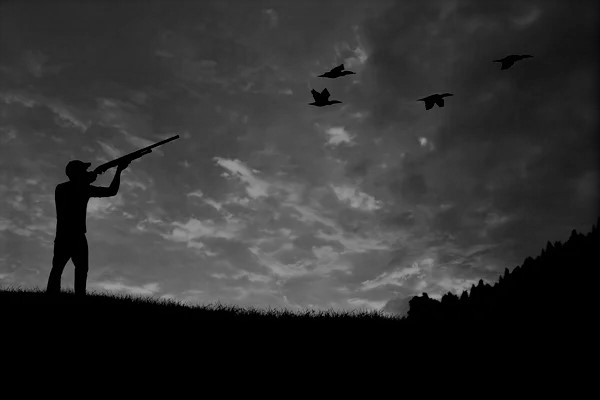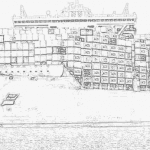
I was the favorite grandchild of my grandfather. At least a hundred times I would have heard my mother detailing my grandfather’s expression and his comment on seeing the newborn.
His eyes were lit, a rare grin revealed the top and bottom rows of teeth. Taking me in his sturdy hands, he proudly declared: “This is my grandson”.
Already blessed with three grandsons and a granddaughter, this statement was intriguing for the other family members. They were busy solving the puzzle for the next few days as nobody dared to seek a clarification from him. On popular consensus, they concluded that my complexion, which was a darker shade of brown compared to my cousins, could have elated my grandfather.
My grandfather, Kavalankattil Mathai, reddish brown in complexion and sturdy like a mahogany tree, owned a chiseled body even in his sixties. I have always seen him in his mundu (lower body garment) that barely covered the lower part of the body. It would be mostly tucked up till the thighs for convenience. He would confidently move into a group of prominent men and women without covering his hairy tree trunk-like torso. That confidence came from decades of fearless struggle and hard work and the pride of having lowered his head before none.
My grandfather was the third son of Kochouseph and Orotha, who lived in a mid-range town of erstwhile Travancore. In his late twenties, he got married to Kunjumariya, a slender girl with a pale complexion. Her complexion turned healthier and her slender body ballooned up with childbirth, following which she had to squeeze herself into a two-size smaller chatta or jacket and mundu. One end of the mundu was pleated and tucked out from the back so as to make the heaviness of her bottom less visible. She made her large breasts less conspicuous by wearing a transparent kavani (scarf) over the white-colored jacket whenever she went to the church. But she passed on the genes of her pale skin and large eyes to her three sons and daughter and further down to all her grandchildren, except me.
During the 1940s, many Syrian Christian families of Travancore were migrating to the sparsely populated forest lands of the Western Ghats. Sons of larger families, who were not satisfied with their meagre share of family property, felt the need to replant themselves in greener pastures. Syrian Christians then measured their success and achievement in life with the land they owned and with each added acre of land, their pride too swelled- the pride of having achieved something on their own and pride of being a respectable member of the parish community. Churches and the clergy weighed their members in terms of their wealth, which was measurable by the land they owned. The pomp of the parish church was directly proportional to the wealth of its members, as it was run with mandatory collections from the members. They had to part with a certain percentage of their earnings regularly to the church. If delayed, the church also had its parish “members” who would visit the houses and take away the church’s share of the farm produce. Needless to say, the wealthy always received better treatment from the clergy.
This quest for respect, a sense of achievement, and pride took many uphill. From the foothills of the Western Ghats, they moved up, cleared forests, planted tapioca, areca nut and spices, and later rubber.
Mathai left Palai, a small town in today’s Kottayam district, after the birth of his first son. From the closest village, he moved up into the forest and cleared a tiny piece of land that cleaved two hills. He built a tiny hut with wood, stones, mud, and palmyra leaves and started living with his family. Both at night and day, they were startled by uninvited visitors, who sometimes crawled in through the windows, squeezed in underneath the door, or just barged in when the doors were left unlatched. The wilder natives of the forests were curious about the new intruders. A snakebite or a scorpion bite, foxes at night, and monkeys in the kitchen soon lost their novelty.
Kunjumariya could not sleep properly for several months. But she never complained, nor insisted on returning to her ancestral home. Getting married itself was a privilege as her two elder sisters had opted to join the nunnery. At the end of persuasive sessions by nuns after the Sunday catechism classes, the girls felt that they were meant for a higher “calling”.
Kunjumariya’s father, too, was relieved, as he did not have to worry about the dowry of two of his daughters. During the wedding, Kunjumariya got a gold chain, a bangle, and ear hoops as a patrimony, while her brothers divided the land between them.
The struggle for survival against nature, wild animals and diseases taught Mathai several things. In two years, he was no longer the Mathai who left his father’s house. He learned a lot about the land, the animals, and farming. By then, he cleared a large portion of land around his hut and expanded his farm. Whatever he planted grew fast in the virgin land. He could trace water channels underneath the soil, could predict which part of the hill was prone to landslides and which rock, perched up precariously, could roll down during rains. His knowledge about the earth was a treasure that benefited all the later settlers. When others arrived, Mathai was owning two adjacent sides of the hills and the hut was replaced by a large sprawling house that could give his own ancestral house a run for the money. He provided Kunjumariya with all the little comforts in life to compensate for the trying times she stood with him. His land was no longer measured in cents or acres but as hill slopes.
As the migrant numbers grew, a small village square came up, shops popped, and they named the place ‘Mathai City’. Mathai’s children climbed down to the school every day and proudly introduced themselves as residents of Mathai City, named after their own father.
Later, Mathai City too got its own school and church, and needless to say, Mathai was the most prominent member of the laity. He generously contributed towards building the church and the parish house as well as the school on the church land. At home, managing the spiritual life of the family was Kunjumariya’s responsibility. Kunjumariya never interfered in matters related to land, property, or money. She happily cooked and served the family and the visitors. Her conversations revolved around fish curries tempered with Malabar tamarind, dry beef masala, and cooked tapioca.
But she was the emissary of the church in the house and was entrusted with the job of leading the family in the church way. But the church also ensured that she never dominated her husband by repeating the Biblical verses: “Wives, submit yourselves unto your own husbands, as unto the Lord. For the husband is the head of the wife, even as Christ is the head of the church: and he is the savior of the body. Therefore, as the church is subject unto Christ, so let the wives be to their own husbands in everything.”
Kunjumariya ensured every member attended the ‘Ave Maria’ prayer and the litany of the Blessed Virgin Mary in the evenings. Mathai and the children had to wind up whatever they were doing and stand behind her and repeat the prayer after her. While Mathai took care of the earthly life, she took up the mantle of leading them to heaven. For her, heaven was as real as the backyard of her house, familiar as the plants and trees that grew there. Angels and cherubs of that beautiful heaven were as familiar as the hens and roosters loitering in the backyard. Every thought, word, and deed was judged by the guards in heaven, as they were consistently evaluating each human being’s prospects of entering the abode. The mortals ate, drank, prayed, and worked to die and ascend to heaven. Life just happened in between.
Mathai would justify every action of his with biblical verses. Over the years, he developed a taste for the meat of wild animals like sambar deer, wild boar, and gaur, and would not have a meal without their crunchy bites. He owned a double-barrel gun and would set out for hunting at night once in a fortnight or whenever his stock of the meat was over. He would be assisted by Cheruman, a tribal youth, during the process. Cheruman was a personification of loyalty that had grown over the years into abject servility. He would never dare look at his master’s face, and his master’s words were unquestionable instructions. I have never seen him utter a word in front of my grandfather. He would carry the gun along with powder, salt, and knife and accompany his master to the forest.
Mathai took pride in his sharp sense of hearing and accurate shooting skills. Once he fired the gun in the dark, he would not even wait to see whether the animal was dead. He would walk back to his house. It was Cheruman’s job to fetch the animal’s body. He would chop it into meat chunks, clean it, apply salt and dry it in the sun for a day before bringing it to his master’s house.
Kunjumariya would apply chilli and other spices to a few pieces and deep fry them in fresh coconut oil, which would then go with hot rice. Rest of the meat would be sun-dried for a couple of days before hanging and smoking it inside the chimney. In order to justify his right to kill wild animals, he would quote the Bible: “Then God said, ‘Let us make man in our image, after our likeness. And let them have dominion over the fish of the sea and over the birds of the heavens and over the livestock and over all the earth and over every creeping thing that creeps on the earth.”
After Mathai’s sons completed school, they were sent to the college, which was 40 km away from the nearest town. Mathai wanted them to get employed, as he thought his sons were not sturdy enough to manage his farms. Even in his sixties, he would walk around the entire length and breadth of his land every day and do strenuous jobs like a twenty-something youth.
After I was born, he partitioned the land between his sons and me. None of my cousins directly got the property from their grandfather. He would take me through the six-acre land he had bequeathed me and would suggest ways to farm it when I grew up. He passed on his acquired knowledge about the land, water, rains, seeds, fruits, and farming to me during those trips.
On our way to school, we would always have a treat of guavas and water apples waiting for us. Jayasree, a young woman of a house downhill, always ensured that we received a share of the fruits grown on her land and the sweetmeats she made. She would eagerly enquire about us and family members while handing it over to us. Kunjumariya never liked us receiving them from her. But we continued to secretly accept them. The investigation to discover the reason behind Kunjmariya’s dislike for Jayashree brought out some old stories about our family.
Our youngest uncle, or Mathai’s youngest son, was in love with her before we were born. When Mathai and Kunjumariya knew about it, a volcano erupted at home. The elders in the family had assumed the duty to preserve the purity of the breed without getting lost by mixing with ‘others’. Once the volcanic ashes appeared to settle down, our uncle announced his decision to take up priesthood. That was double joy for Mathai, as a priest from the house increased the respect of the family in the community. Jayasree remained a spinster and discovered happiness in sharing the fruits and sweetmeats with us.
During my high school days, we were summoned back home one day. When we reached home, the entire village had gathered at my house. The clergy of our church and the nearby churches too had come over. Hearing the sound of women wailing, I rightly guessed that someone had died in the family. On entering the house, I realized it was my grandfather. I had had dinner with my grandfather even the previous night when he looked hale and hearty as ever.
The whole village was whispering about the suicide. He had closed his room from inside, positioned the double-barrel gun upright and bent over the muzzle of the gun, and pulled the trigger.
The entire village was in shock. How could he deprive himself of all his prospects of entering the heavenly abode? “Do you not know that you are God’s temple and that God’s Spirit dwells in you? If anyone destroys God’s temple, God will destroy him. For God’s temple is holy, and you are that temple,” thus said the holy word.
The man who never feared wild animals, men, rains, floods, or landslides, had taken his own life unable to withstand something. What was that, something?
For the next few days, I was totally engrossed in finding out that “something”. On the day of his death, he went out into his land and walked toward the forest as soon as he woke up. Usually, he would venture out only after breakfast. He came back, shut in, and killed himself.
The previous evening, he had conversations with the workers in the morning and family members as usual and followed the daily routine. In the evening, as he was walking along the road, a police officer from the nearest station alighted his vehicle to greet him. After a casual conversation that lasted about five minutes, he left.
One of the workers told me that it was a casual talk in which the police officer enquired about Mathai’s health and farming. He was coming down from the forests. When Mathai asked about it, the officer said that he was investigating the case of a missing boy. The boy had gone missing a week back and his severed head, palms, and feet were retrieved near the forest stream the previous day.
On hearing this, I walked towards the forest stream. The police party had taken away the retrieved body parts. I wandered around and under one of the trees; I saw something wrapped in a week-old newspaper. I opened it. It contained powder salt which appeared to be partly used.
Sangeetha G works as a journalist in India. Her flash fiction and short stories have appeared in Sky Island Journal, Down in the Dirt, Academy of the Heart and Mind, Kitaab International, Indian Review, Nether Quarterly, Muse India, Storizen, The Story Cabinet and Borderless Journal. Her stories have won Himalayan Writing Retreat Flash Fiction contest and Strands International Flash Fiction contest. Her debut novel ‘Drop of the Last Cloud’ was published in May 2023.








Leave a Reply